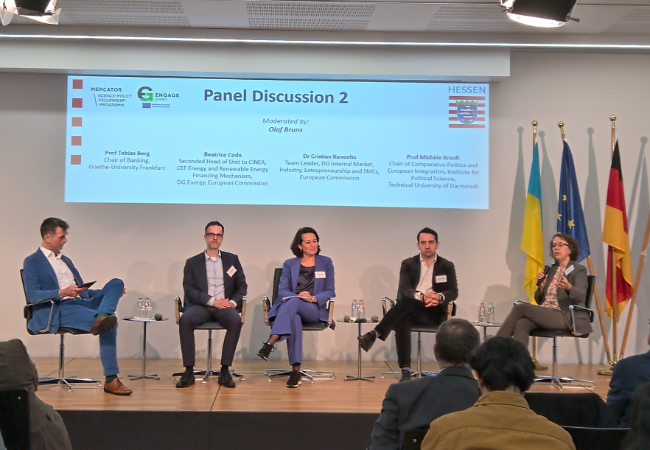Past Activities
20 February 2026, Olomouc
Training on Spatial Statistics

The final training for policymakers delivered by Palacký University team on 20 February built on two previous sessions focused on working with ArcGIS and on data visualization for the development of the open data portal. This session introduced participants to the fundamentals of spatial statistics—a set of methods that go beyond simple visualization to quantitatively analyze spatial patterns. While maps can highlight areas with the highest or lowest data concentrations, spatial statistics make it possible to measure spatial dependence, determining whether patterns are clustered, random, or regularly distributed, and to test these patterns statistically. The training included hands-on exercises, where participants applied selected spatial statistical methods in practice, strengthening their ability to interpret and use spatial data for evidence-based policymaking.
29 January 2026, Darmstadt
ON-SITE VISIT: Future Technologies for Energy and Security
- How can renewable energies be stored safely and climate-neutrally over longer periods of time?
- How can digital resilience be increased in the event of a crisis in Germany?
Answers to these questions are being researched at the Technology and Transfer Centre Metal Energy Hub (German) and at the Application and Transfer Centre Digital Resilience Xchange (DiReX) (German) at the Technical University of Darmstadt.
As part of the On-Site Visit: Future Technologies for Energy and Security on 29 January 2026, researchers from the Technical University of Darmstadt presented technical innovations and practical solutions in specific fields of application and discuss current political and economic challenges with guests from politics, administration, associations, media, NGOs and companies.

28 October 2025, webinar (Lyon/Venice)
Bilingual Webinar on Agri-Food Policy in France and Italy


On 28 October 2025, Ca' Foscari University of Venice and Université Lumière Lyon 2 ran a pilot of the bilingual webinar format (French/Italian simultaneous interpretation available) as part of the ENGAGEgreen project. The one-hour online event, titled “Agri-Food Policy: A comparison between France and Italy", featured a dialogue between two experts on national and local agrifood policies.
Prof. Michele Marzulli opened the webinar introducing speakers and organisers and welcoming the attendees.
The first presentation was given by Jacques-Aristide Perrin, researcher at Université Lumière Lyon 2. His talk covered topics ranging from food geography to economics and social aspects. The approach to agri and food policies he presented draws on research experience and highlights not only the opportunities but also the challenges of the green transition. He emphasised that this process is not necessarily linear and that policies must be adapted to the specific characteristics of each territory. Among the other topics addressed were initiatives promoting zero-kilometer agriculture, food education policies for younger generations, the quality of food products, and the importance of preserving the landscape as an essential component of local culture.
His presentation was followed by Marina Montedoro, Director of Coldiretti Veneto, leading organisation of agricultural entrepreneurs in Italy. Her contribution first highlighted Perrin's approach, which effectively brought to light several concerns shared by both Italian and French farmers. She then recalled some key milestones in European policy (such as the 2020 Agenda) and emphasised the role of associations like Coldiretti — to represent interests and act as an intermediary body between public institutions and civil society. She also addressed several pressing issues in the agricultural sector, including the volatility of food prices, the need to insure production against climate-related risks, and the extreme fragmentation of the sector — a feature that translates into a relatively limited capacity of farmers to negotiate with policymakers. However, farmers do not see themselves merely as victims of European policies; they also aspire to play an active role in shaping policy directions and safeguarding citizens' rights, such as the right to healthy food.
The debate then moved on to another key topic for the ENGAGEgreenreen project: the digital transition. As Montedoro pointed out, agriculture today makes extensive use of cutting-edge technologies to enhance production, from satellite imagery to drones.
The discussion closed by addressing an important issue that directly concerns ENGAGEgreen: the difference in timing between academic research (necessarily long-term) and the dynamics of the agri-food economy. Therefore, the challenge for the future is to continue developing projects and initiatives that bridge these two worlds.
22 October 2025, Olomouc
Preparatory workshop: Use of sensor data for smart urban planning

On 22 October 2025, Palacký University Olomouc organised a preparatory workshop for students who intend to participate in the Hackathon of the Olomouc Region 2025. The Hackathon is a 3-day event (14 – 16 November) focused on using open data to tackle transportation and climate change in cities. The preparatory workshop on using sensor data for smart urban planning hosted three guest speakers from the University, a smart city platform CityOne and an architecture studio, Jakub Cigler Architekti.
6 October 2025, Olomouc
Discussion: Introduction of the Open Data Portal of the Moravian-Silesian Region

Following Martin Dvořák’s lecture on April 7, which focused on practical experiences in developing the Open Data Portal of the City of Brno, this session with the same guest speaker aimed to introduce the regional-level Open Data Portal of the Moravian-Silesian Region. The lecture sought to facilitate cross-regional exchange of experiences by comparing it with the Open Data Portal of the Olomouc Region. However, the focus shifted from technical aspects to data visualization and was tailored to a student audience, with the goal of inspiring participants to develop competencies relevant to public administration and policymaking.
25 September 2025, Frankfurt
Best Practice Exchange: Knowledge Transfer in the Rhine-Main Region

As part of the Mercator Science-Policy Fellowship Programme and the ENGAGEgreen project, Goethe University Frankfurt organised its fourth meeting of colleagues from Rhine-Main universities and non-university scientific institutions in the Rhine-Main area who deal with the topic of transfer in politics and administration. An article on the workshop can be found here.
12 June 2025, Brussels
Stakeholder Conference in Brussels

The ENGAGEgreen project and the Mercator Science-Policy Fellowship-Programm co-organised the Conference "Unlocking Science-Policy Synergies for Europe's Green and Digital Future".
The programme can be found here.
27 May 2025, Vienna
ENGAGEgreen partners joint forces with Urban Imprint partners to spark European debate on public innovation and universities


Partners from the ENGAGEgreen project actively participated alongside Urban Imprint universities in the international conference “Building Bridges: Shaping Europe's Science-for-Policy Landscape", organized by the Scientific Advice Mechanism (SAM) of the European Commission, held on 26 and 27 May at the Austrian Academy of Sciences in Vienna.
During the second day, a parallel session titled “Bridging the gap: universities and municipalities co-producing solutions for urban transformation" was coordinated by the University of Granada (UGR), focusing on innovative co-creation between universities and local governments to tackle major urban challenges across Europe such as socioeconomic development, depopulation, digital transformation and climate change.
The session featured contributions from several partners, including representatives from the ENGAGEgreen consortium — the University of Ca' Foscari Venice, the University of Olomouc and the University of Vic - Central University of Catalonia — alongside members from the Urban Imprint project, such as the University of Aveiro, the University of Graz and the École Nationale Supérieure d'Architecture Paris-La Villette.
This event exemplified both the science-policy dialogue, which is the fundamental pillar of ENGAGEgreen, and the strong collaboration between these two Erasmus+ projects, under the coordination of the UGR. This ended up positioning these consortia as key contributors to social innovation and territorial transformation at the European level.
ENGAGEgreen's participation alongside Urban Imprint universities strengthens the network of institutions committed to co-producing knowledge and solutions that respond effectively to Europe's urban challenges. The engagement at this high-level forum consolidates their role as pivotal actors in the science-policy dialogue and as drivers of academic-based solutions to urgent societal issues.
For more information about the event and its program, visit: https://scientificadvice.eu/conference/programme/
20 May 2025, Mainz
Science Communication as Knowledge Transfer: European Best Practices & Perspectives. Presentation of project results at international conference in Mainz.


The ENGAGEgreen project and Mercator Science-Policy Fellowship-Programme co-organised the international conference “Science Communication as Knowledge Transfer" in cooperation with Johannes Gutenberg-University Mainz, the Rhine-Main-Universities, the European University Alliance ForThem, and the Horizon project “Co-Creating the EU Competence Centre for Science Communication (COALESCE)" on 20 May 2025.
Tome Sandevski moderated the panel discussion “What is knowledge transfer? On the role of Science Communciation, Science Policy and the Notion of Transfer in Academia". Professor Elena Link (Johannes Gutenberg University Mainz), Dr Patrick Honecker (Chief Communication Officer at TU Darmstadt), Professor Jason Pridmore (Erasmus University Rotterdam) and Dr Mario Scharfbillig (Joint Research Centre/European Commission) debated various approaches and issues regarding science communication.
Dr Simone Haasler and Tome Sandevski provided an overview on the ENGAGEgreen project and the Mercator Science-Policy Fellowship-Programme of the Rhine-Main-Universities in two pitches. Tome Sandevski conducted a workhop on policy engagement for researchers and research managers in the afternoon.
The programme of the conference is available here.
Image rights:
Stefan Saemmer (top)
Peter Pulkowski (bottom)
20 May 2025, Olomouc
Training for Research Managers

The ENGAGEgreen Policy Engagement Toolkit
was presented on 20 May during the RMA Power Week, a 5-day intensive workshop
for project managers at Palacký University Olomouc. As part of the programme, a
lecture titled Public Administration as a Project Partner: Communication
Methods explored topics such as effective communication for building
collaborations, common challenges, examples of good and bad practices, and
recommendations for various forms of cooperation.
Further in formation on the RMA Power Week can be found here:
16 May 2025, Webinar
How Can Science Managers and Knowledge Exchange Officers Support Scientists Regarding Policy Engagement?

Tome Sandevski organised a webinar for science managers and knowledge exchange officers for the FORTRAMA network on 16 May 2025. The webinar presented key lessons learned from the ENGAGEgreen project and the Mercator Science-Policy Fellowship-Programme. Regarding policy engagement researchers are often only familiar with time-consuming formats such as commissioned research or participation in expert bodies. Research managers and and knowledge exchange officers can support the policy engagement of scientists by informing researchers about the range of possible (time-efficient) knowledge exchange formats and/or supporting them in planning and implementing various knowledge exchange formats. The webinar provided an overview of written (e.g., policy briefs, contract research/longer studies) and dialogue-oriented transfer formats (e.g., workshop formats, visits to research institutions, expert discussions) as well as an overview on how to integrate them into the everyday work of research managers and researchers.
7 May 2025, Venice
Seminar "From research to policy engagement"


How to translate research funding into policy? This is the question that the EngageGreen Erasmus+ project moves on. And this is the purpose of WP3 and WP4: to try to translate the experiences gathered during the project into concrete tools and strategies to have a real impact.
The Ca' Foscari University of Venice seminar entitled "From research to policy engagement" was dedicated to these goals. The audience is mixed: university staff (such as research office staff), young researchers (on stage or PhD students), professors and other people interested in the topics.
This was followed by a round table with other experts in a dialogical form with the audience. The aim was to share information and knowledge.
What is really interesting is the tentative experience of increasing the capacity of institutions to be open to the idea of policy engagement as a common and normal practice in daily research activity. This is the core of the WP4 activity: the perspective of capacity building as a legacy of the project.
However, some issues are already relevant to note: the first could be called the "share the knowledge" issue. Experts participating in the event stressed the idea that it is a common experience that there are a lot of initiatives of political engagement, but not always it is easy to share each other's experiences. Sometimes the organization seems to follow the silo model in the workflow. So different department (horizontal) and governance level (vertical) are not even working in synergy.
This conclusion may not seem new or original, but what really makes a difference is that the project (EngageGreen) could be a basis to change the daily practice.
Further information can be found here in Italian.
7 April 2025, Olomouc
Discussion: Sharing Experiences in Building an Open Data Portal

On April 7, a discussion on sharing experiences in building an open data portal was held at Palacký University Olomouc. The event welcomed an external guest — Mgr. Martin Dvořák, who, as the head of the Open Data Department at the Brno City Hall, was involved in developing the city's open data portal. Following his presentation on practical experiences, the discussion focused on data-related, technical, and organisational aspects, as well as potential future developments, including possible collaboration between policymakers from Brno and Olomouc.
13 February 2025, virtual workshop
Measuring policy impact with altmetrics

31 January 2025, Frankfurt
Workshop on understanding policymaking

24 January 2025, Olomouc
3rd Mentoring Lecture for Policymakers in the Olomouc Region

The 3rd mentoring lecture for policymakers on Specifics of the Olomouc Region and International Experiences in Knowledge Transfer between Municipalities, Universities, and Companies was delivered by experts from the Science and Technology Park of Palacký University Olomouc.
This lecture shed light on how effective collaboration between the academic and public sectors can enhance the region's innovation potential. We focused on areas of specialisation, the region's socio-economic conditions, the integration of the cultural and creative industries, and their impact on municipalities (with examples from Olomouc and Šumperk). In the second part of the lecture, we compared foreign models (Netherlands, Scandinavia, Greece, Slovenia) with the Olomouc Region and discussed the role of the UP Science and Technology Park. This was followed by a discussion on adapting international experiences to local conditions, addressing key obstacles such as legislation, funding, or differing priorities among stakeholders.

23 January 2025, Granada
ENGAGEgreen hosts a webinar to strengthen ties between academia, public administration, and the agricultural sector

On January the 23rd 2025, a webinar was held as part of the Erasmus+ ENGAGEgreen project, organised by the Vice-Rectorate for Social Innovation, Employability, and Entrepreneurship of the University of Granada. This webinar served as a platform for dialogue, bringing together academic researchers and public administrations to discuss strategies and projects for soil restoration in the region. One key initiative mentioned during the event which serves as an example to follow was Granada Tierra Viva, also funded by the European Union. Focused on knowledge transfer and the intersection of policy and science, the event aimed to strengthen collaboration between academia, policymakers, and agricultural and livestock communities in Granada.
The webinar featured prominent representatives from the University of Granada, including Jesús Rodrigo and Ana Romero, professors of Geography and Edaphology, respectively, and Esteban Romero, Vice-Rector for Social Innovation, Employability, and Entrepreneurship.
They were joined by key representatives from governmental entities, such as Camino Molina, head of the Regional Agricultural Office (OCA) of La Vega de Granada in Santa Fe; María Ángeles Álvarez, head of the IFAPA Camino de Purchil Research and Training Center, part of the Andalusian Institute of Agricultural and Fisheries Research and Training (IFAPA); Juan Manuel Arcos, technical advisor on organic production at the Andalusian Agency for Agricultural and Fisheries Management (AGAPA); as well as representatives from the OCA of Guadix.
The webinar focused on soil as a fundamental resource for generating wealth and fostering sustainability in the region. Discussions explored the creation of a Living Lab, an open co-creation and collaboration ecosystem integrating academia, policymakers, citizenship, and the private sector under a quadruple helix model.
During the session, academic researchers and representatives from governmental entities debated the organisation of future roundtable discussions aimed at developing an initial diagnosis of threats and issues related to soil degradation. These discussions would lay the groundwork for designing restoration and recovery strategies that benefit local and regional communities. The importance of fostering a fluent dialogue between researchers and policymakers—who serve as a bridge to reaching farmers and livestock producers—was emphasized as a critical element of the project.
During the webinar, Esteban Romero introduced the cornerstone initiative of the ENGAGEgreen project: the UGR Regional Councils. This pilot program aims to promote territorial cooperation through a collaborative work environment based on science-policy dialogue. Romero outlined the methods and key areas of work for the initiative, which is designed to facilitate joint action across the 10 main regions of Granada. He also encouraged participants to join this innovative platform, which seeks to generate sustainable solutions and tangible benefits for the region through a participatory and multidisciplinary approach.
Among the commitments made, Ana Romero urged representatives of the Regional Agricultural Offices (OCAs) to inform farmers and livestock producers about an upcoming event on February the 13th. This event will serve as a first opportunity for all quadruple helix stakeholders to engage directly. Camino Molina suggested including farmers and livestock producers from a range of profiles in future discussions. Meanwhile, Juan Manuel Arcos emphasized the importance of addressing soil-related challenges at both regional and local levels.
The webinar concluded with the announcement of the February the 13th event, which will bring together public administrations, academic researchers, farmers, and livestock producers to establish working groups focused on sustainable development and soil recovery in Granada.
The report in Spanish can be found here.
20 January 2025, Granada
University of Granada launches County Councils initiative to drive local development

13-17 January, Lyon
MOTIF Public Policy Design

The intensive seminar “MOTIF on Public Policy Design" was held at the Université Lumière Lyon 2 as part of the ENGAGE green project. It took the form of a week-long hackathon on the theme of food with the following challenge: 'Combating food insecurity among young people', in collaboration with the City of Lyon and the Boutique des Sciences.
Supervised by Simon Gadras, lecturer and researcher, the aim was to develop innovative proposals in response to this issue, as requested by Lyon's municipal authorities, while using the collaborative approaches of Public Policy Design. The proposals were presented to the city's decision-makers on 17 January.
Further information can be found here.
18 December 2024, virtual/Granada
First Informational Meeting about UGR Regional Councils

The University of Granada held its first informational meeting on the establishment of the UGR Regional Councils with 46 participants, including professors, lecturers, researchers and administrative staff. The meeting, stemming from the ENGAGEgreen project and aligned with the Impronta Granada initiative, focused on the collaboration between the university, public administration, private sector and citizens across the region of Granada.
During the session, the internal structure of the Regional Councils was outlined, emphasizing the role of mayors, municipalities, and several stakeholders. Key discussions included the identification of regional needs so as to transfer knowledge from the University, the connection to Granada 2031 European Capital of Culture and the Living Lab methodology for the ongoing evaluation. The formal establishment of the Councils will take place on the 20th January 2025, with further meetings planned throughout the early months of 2025.
12 December 2024, virtual/Berlin
Two presentations of science-policy dialogue schemes on a single day

Tome Sandevski presented an overview of various types of science-policy dialogue schemes for the general partner meeting of the AI FORA project (artificial intelligence for assessment) on 12 December 2024.
On the same day, he participated in a workshop on science in parliament at the annual science communication conference in Berlin, followed by a presentation on science communication for policymakers.

3 December 2024
Second meeting of ENGAGEgreeen advisory board

29 November 2024, Frankfurt
Workshop Policy Engagement Toolkit


Tome Sandevski conducted a workshop for 13 early career researchers, science communication, and policy engagement officers at the Rhine-Main-Universities and the Institute for Social-Ecological Research (ISOE) in Frankfurt.
The first part of the workshop provided an overview of policymaking processes, scientists' self-understanding, and written and interactive formats of policy engagement.
Experts from academia and policymaking joined the second part of the workshop. Dr Lukas Herr (policy advisor of the parliamentary group of the SPD in the regional parliament in Rhineland-Palatinate and policy fellow at the Rhine-Main-Universities), Priska Hinz (former MP and minister of environment in the state of Hessen and member of the advisory board of the Mercator Science-Policy Fellowship-Programme), Niklas Götz (Scientists for Future) and Dr. Vincent Lindner (Leibniz Institute for Financial Research SAFE) discussed their experience in terms of policy engagement.
26 November 2024, Venice, Italy
Ca' Foscari Workshop on Institutional and territorial transformations in the perspective of co-creation

Ca' Foscari Challenge School, together with the Governance & Social Innovation Centre of the Ca' Foscari University Foundation and the Department of Economics (through the Erasmus+ funded project ENAGEgreen) organised a three-day workshop aimed at students, Public Administration and Third Sector operators, local administrators and citizens.
With the intention also to also make the activities related to the Ca' Foscari Masters in "Public Administration" and in "Governance, Innovation and Welfare Management" better known , the course included talks on some of the hottest topics for our territories. The course included dialogues between the Directors of the Masters, public policy and welfare experts and the discussion of concrete experiences.
26 November 2024, Olomouc, Czech Republic
Mentoring lecture for policymakers vol. 2: The Role of Public Administration in Research & Innovation


21/22 November 2024, Bonn
Presentation of ENGAGEgreen interim project results in Bonn


Tome Sandevski presented the interim results of the Erasmus+ ENGAGEgreen project at a conference of the German Academic Exchange Service in Bonn. The record of the project is as follows:
- 8 universities in 5 EU-countries
- 262 researchers
- 272 policymakers from 70 ministries, agencies and EU-institutions
- 80 university students
- 27 dialogue schemes or events in 5 EU countries.
We are looking forward to conducting transnational science-policy dialogue formats, publishing our policy engagement toolkit, and organising numerous training events in 2025.
19 November 2024, Berlin
Presentation of policy dialogue programmes and policy engagement toolkit in Berlin

Tome Sandevski had the chance to give presentations on policy engagement in Berlin on 19 November 2024. He gave the first presentation at the 11th network conference, which focused on the issue of scientific advice for policy.


The second presentation took place at a workshop at the Federal Ministry of Education and Research (BMBF), which was organised by the government's initiative on science communication (#FactoryWisskom) task force on policy engagement. The workshops focused on how networks can promote policy engagement. Tome Sandevski elaborated on the ENGAGEgreen approach of piloting science-policy dialogue initiatives, knowledge sharing among the eight ENGAGEgreen partners in five EU countries, developing a policy engagement tookit, and the capacity building and dissemination measures. His presentation was followed by a presentation by Sarah Chaytor (University College London) who presented the networks Universities Policy Engagement Network (UPEN) und Capabilities in Academic Policy Engagement (CAPE). About 20 representatives of the Federal Ministry of Education and Research, various universities, the Leopoldina, the German U15, Helmholtz Alliance and other organisations participated in the workshop. Our policy fellows Dr Maximilian Müller-Härlin (Federal Ministry of Education and Research) and Dr Friederike Schröder (German U15) participated in the workshop.
14-15 November 2024
Presentation of policy engagement toolkit at the annual event of the research group Interdisciplinary Public Policy

November 2024, Frankfurt/Rhine-Main
Policy Fellowship Cohort 2024/2025 visits Rhine-Main-Universities: New milestone reached!


The two fellowship programs cooperated with the Research Institute on Social Cohesion (FGZ). Thus, researchers outside the Rhine-Main area also participated in the meetings.
In the evening, Prof Rainer Forst (Political Theory and Philosophy/Goethe University Frankfurt) introduced the Research Institute on Social Cohesion. This part was followed by a panel discussion on uncertainty in times of crisis.
You can find the detailed report here.
October 2024
1st Anniversary of the ENGAGEgreen Project

22 October 2024, Olomouc, Czech Republic
Mentoring Lecture for Policymakers vol. 1: Knowledge and technology transfer at Palacký University Olomouc

On October 22, Palacký University Olomouc (UP) organised the first in a
series of mentoring lectures for policymakers. The lecture was delivered by
Jakub Havlín and Petr Kubečka, a project manager and the director of the
Science and Technology Park (VTP), a center for innovation and technology
transfer at Palacký University Olomouc. VTP provides support to university
students and employees, for example by assisting with the licensing of
technologies developed by UP researchers and the commercialisation of products
created by UP teams. However, VTP also serves as a point of contact for
policymakers at local and regional levels who wish to exploit research results
or seek university partnerships to enhance business development in the region.
This first mentoring lecture provided policymakers with an overview of VTP’s
activities and services and guided them through the potential cooperation
process.
18-20 October 2024, Olomouc, Czech Republic
Hackathon "When Data Speaks"

- NTL-CUP: Smart parking app
- DataQ: Armed attacker detection system
- Střelci: Safest route home app
Best Business: TRIX (Olomouc Tourism chatbot)
11 October 2024, Olmouc, Czech Republic
Training sessions at Palacký University Olomouc

8 October 2024, Université Lumière Lyon 2, France
Public presentation to the town council of the 7th arrondissement

The Town Hall of the 7th arrondissement, in collaboration with the Science Boutique of the Université Lumière Lyon 2, embarked on a process of analysis and understanding of the dynamics at work in the Gerland district in order to propose appropriate public policies.
It was in this context that the Boutique des Sciences introduced an internship programme, with the aim of gathering data and adding insight into the profiles of the arrondissement's new residents as part of the participatory approach.
The results of the study were now presented in front of the 15 members of the selected town council. The observations highlighted trends and areas for reflection to help adapt public policies. The lessons learned from the study will enable the local authority to refine its vision of the district's social and urban dynamics and adopt public policies that are better matched to local realities.
Further information can be found here.
8 October 2024, Université Lumière Lyon 2, France
A Local Authorities-researcher study group scratches at the subject of bedbugs

The first local authority-researchers workshop on the subject of bedbugs was held at the Gerland bio-district on 8 October. The issue has been raised as part of local health contracts, given the proliferation of bedbugs in France in the autumn of 2023. The Université Lumière Lyon 2, as part of the ENGAGE green project, took part, with the presence of a researcher from the POPS research laboratory and the team from the Sciences and Society Department.
This afternoon was an opportunity to strengthen the links between politics and research and to discuss the social and political issues surrounding the proliferation of bedbugs.
While bedbugs are not in themselves a public health problem - for example, they do not transmit disease - they do have an impact on the well-being and mental health of residents, and on quality of life in general.
Further information can be found here.
September/October 2024, Rhine-Main Region, Germany
The second round of visits of researchers to policymaking institutions in Hessen and Rhineland-Palatinate

46
researchers from the Rhine-Main-Universities Darmstadt, Frankfurt, and Mainz
visited 16 policymaking institutions in the regional capital of the
states of Hessen and Rhineland-Palatinate in September and October 2024. The
researchers had 78 meetings with 101 policymaking professionals in Mainz and
Wiesbaden. The meetings took place as 1:1 meetings or meetings in small groups.
The meetings covered a wide range of topics, including environmental threats of
chemicals, mobility, digitalisation in schools, communicating environmental
issues, the potential of AI for public administration, and many other policy
issues.
26 Sepetember 2024, Université Lumière Lyon 2, France
Review of an emerging participatory research project on making the practices of residents from the Lyon's 9th arrondissement more green

On 26 September, the Boutique des Science project on the theme of ecological practices was presented in the presence of François Genouvrier, 1st Deputy for Ecological Transition, Heritage and Public Lighting at the City of Lyon and the Université Lumière Lyon 2, as part of the ENGAGE green project represented by the teams from the Sciences and Society Department and the researcher supervising the project.
The workshops held during the event highlighted to the local authorities the wide range of views on ecology, as well as the diversity and federative dimension of the local initiatives already implemented by the residents.
More information can be found here.
24 September 2024, Webinar by Beta Technological Center and Granada University, Spain
Drought: a global approach from the Iberian Peninsula

Beta Technological Center (Vic University) and Granada University collaborated in the organisation of a webinar within the Erasmus+ project ENGAGEgreen, with a science-policy methodology, facing drought on the Iberian Peninsula area from a global approach.
In the online dialogue we sought the confluence between natural and social sciences, but also between territories and actors. We hope to have contributed to strengthening the link between politics and academia in the search for sustainable solutions to global change and the ecological and digital transition.
In the webinar we had six speakers, researchers from different areas and universities and political representatives from Madrid and Andalusia region. About 50 people registered for the online session and we opened a space for interventions to the public at the end of the event.
June 2024, Olmouc, Czech Republic
Discussion on single repository of datasets

On 27 June, the members of the Palacký University (UP) Pairing Scheme discussed the implementation strategy of a single data repository at the participating institutions (Olomouc region, Statutory city of Olomouc, UP). After initial presentations on the state of the art at the individual institutions, the group debated what data to use (administrative data, research data, etc.) and for what purpose (storage, archiving, sharing), as well as how to build, manage, and fund the repository in line with national law requirements.
The UP team also introduced a new project, EnCLOD (funded by Interreg Central Europe), which plans to effectively use open data for spatial management and city and regional planning, setting up a sensor network focusing on transport and urban heat islands.
26 June 2024, Venice, Italy
Engaging Green Policy Decision Making

On June 26th, within the framework of the Erasmus+ project ENGAGEgreen, the project team of Ca' Foscari University of Venice organized the workshop “Build and enhance the academic approach to public engagement". The roundtable gathered experiences of public engagement from one of the project partners University of Granada (Spain), as well as centers affiliated to Ca' Foscari.
The in-person workshop was followed by an online session titled “Engaging Green Policy Decision Making" open to the public and project partners.
For a detailed report on the event, please use this link.
June 2024, Barcelona, Spain
Presentation of the ENGAGEgreen project at the Provincial Council of Barcelona


May 2024, Olmouc, Czech Republic
Training on publishing and presenting data using Esri Dashboards

On 20 May, Palacký University organized the second part of ArcGIS training
for policymakers. The session focused on publishing and presenting data using
Esri Dashboards, a tool for creating dynamic and interactive dashboards that
visualize spatial data. These dashboards integrate maps, charts, gauges, and
other visual elements to present a comprehensive and real-time view of data in
an easy-to-read format. They are commonly used in urban planning, public
health, and transportation, making them highly relevant for public
administration services. The presentation was followed by several hands-on
exercises to ensure an individualized learning experience for all the
participants.
April 2024, Mainz, Germany
Rhine-Main Science-Policy-Dialogue

In cooperation with Rhineland-Palatinate state institutions, the Rhine-Main universities were able to start a new dialogue: In April 43 researchers from Johannes Gutenberg University Mainz visited nine ministries, the state chancellery and the state parliament administration in Mainz and conducted a total of 90 face-to-face meetings with about 80 policymaking officials. The topics of discussion ranged from digitalisation and artificial intelligence to energy, climate and the environment, education, social cohesion and innovation in the economy. We received the evaluation results today: Both policymakers and researchers rated the format as very beneficial. We are particularly pleased that literally all respondents stated that they would participate in the format again in the future. It is also interesting to note that almost 60 per cent of respondents from state institutions told us that they had had little or no contact with researchers before taking participating in the format. Thus, there is a great potential for science-policy dialogue. The pilot project was a success and we are looking forward to the next round of the Rhine-Main Science Dialogue in September 2024!
Picture: Lunch at the State Chancellery on 25 April, 2024, with researchers and policy professionals
24 April 2024, Granada, Spain
Science and Society: The case of French research policy
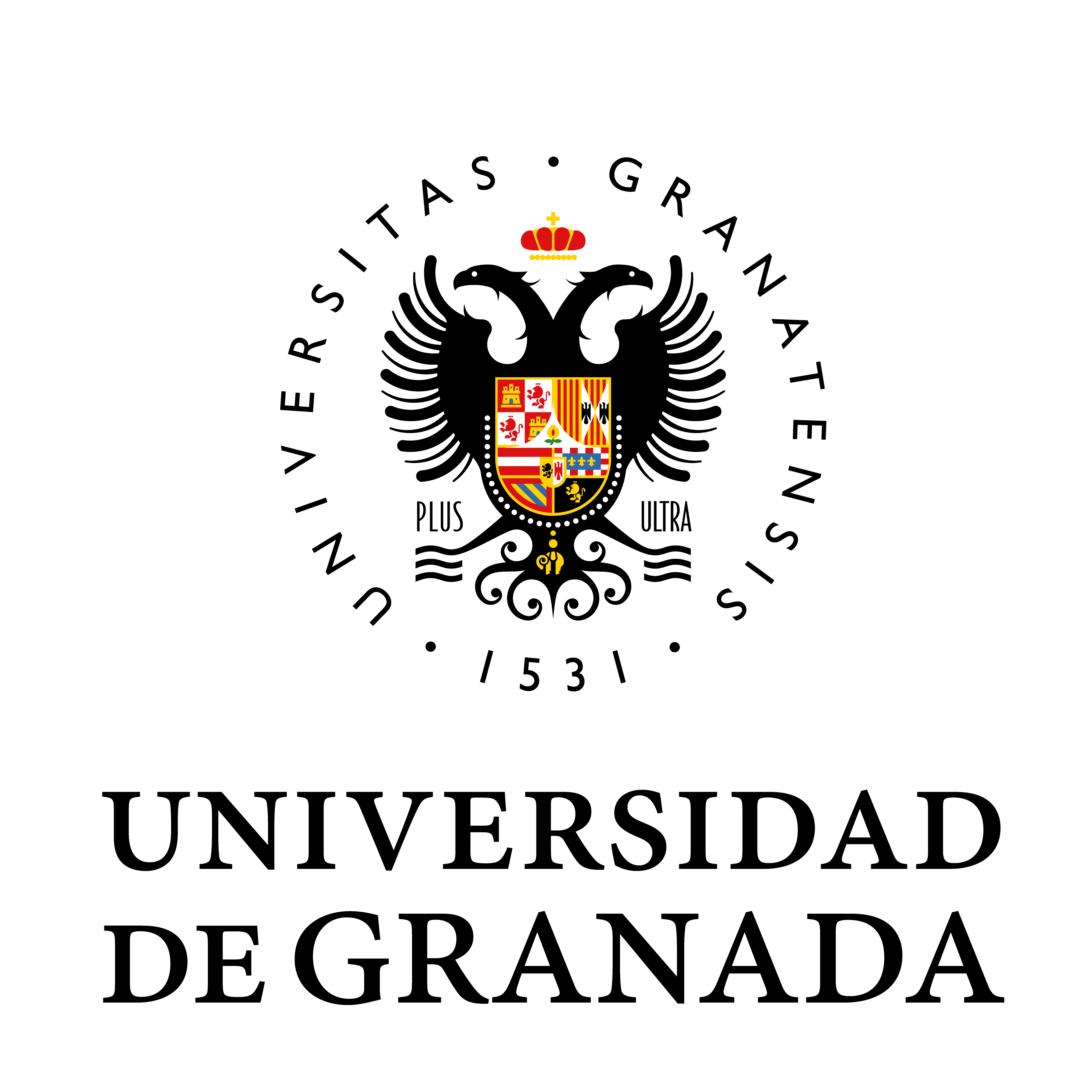
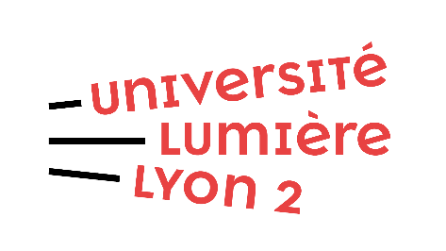
The University of Granada, through MediaLab UGR, in collaboration with the Erasmus Plus EngageGreen project, is pleased to announce the organisation of the seminar "Science and Society: the case of French research policy" presented by Florence Belaën.
Wednesday, 24 April 2024, from 9 to 11 AM, hybrid event:
- In-person: at the V Centenario building of the University of Granada, in the Impronta Space of MediaLab UGR.
- Virtual: https://meet.google.com/vrz-qush-yji through the platform yosigo.ugr.es.
The online broadcast will be recorded and uploaded to YouTube on the MediaLab UGR channels at the University of Granada.
The seminar will be presented by Florence Belaën, a prominent professional at the intersection of science, culture, and society, from Université Lumière Lyon 2. The session will focus on the connection between science and society, referencing the evolution of research policy in France, especially how these policies are promoting a more effective integration of science with the needs and expectations of society. This topic is particularly relevant at a time when trust in academic knowledge faces significant challenges and the need for a fruitful dialogue between science and society has never been more critical.
This seminar is an exceptional opportunity for academics, students, and professionals interested in the social impact of science and technology. For more information and registration, please visit the MediaLab UGR website.
Profile of Florence Belaën
10 April 2024, Olomouc, Czech Republic
Training Session for Policymakers in Olomouc Region
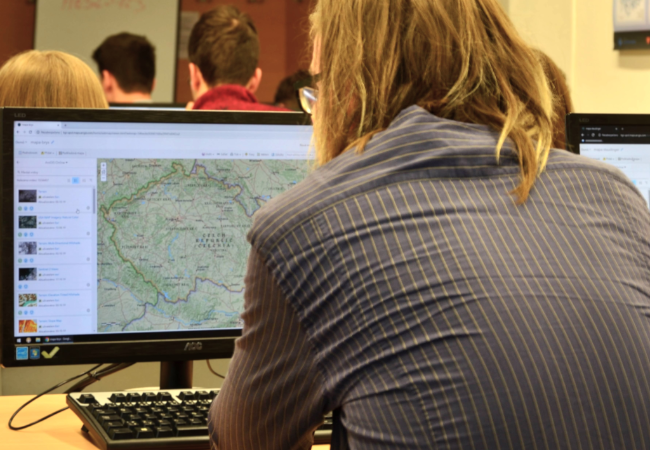
On 10 April, a training session on data presentation and visualisation in ArcGIS Online was organised by the Department of Geoinformatics at Palacký University Olomouc. The training provided policymakers from the Olomouc Region and the Statutory City of Olomouc with a new set of skills in presenting open data by introducing new forms of visualisation. The participants (16 in total) also learned about effective alternatives for internal communication. The software used was ArcGIS Pro and Esri Storymaps. The research team at UP gained valuable insights, and the exchange of community knowledge during the training enhanced new perspectives in geoinformatics.
Picture: Palacky University Olomouc
12 March 2024, Brussels, Belgium
A new Boost for Europe's Green Transition with R&I
KEY TECHNOLOGIES FOR OUR FUTURE
With the 2023 revision of the European Strategic Energy Technology (SET) Plan, the European Commission has identified the financial, political and societal challenges that need to be addressed in order to promote the development and establishment of key technologies for the Green transition. The promotion of new technologies is a cross-cutting task for EU institutions, national governments, businesses and science alike.
The event brings together researchers from the technical, economic and social sciences with representatives of the European Commission to discuss technical innovations for green transition and the political and financial frameworks for the developement and application of key technologies.
28 February 2024, Olomouc, Czech Republic
Discussion: Identification of internal issues in the process of “opening” the data
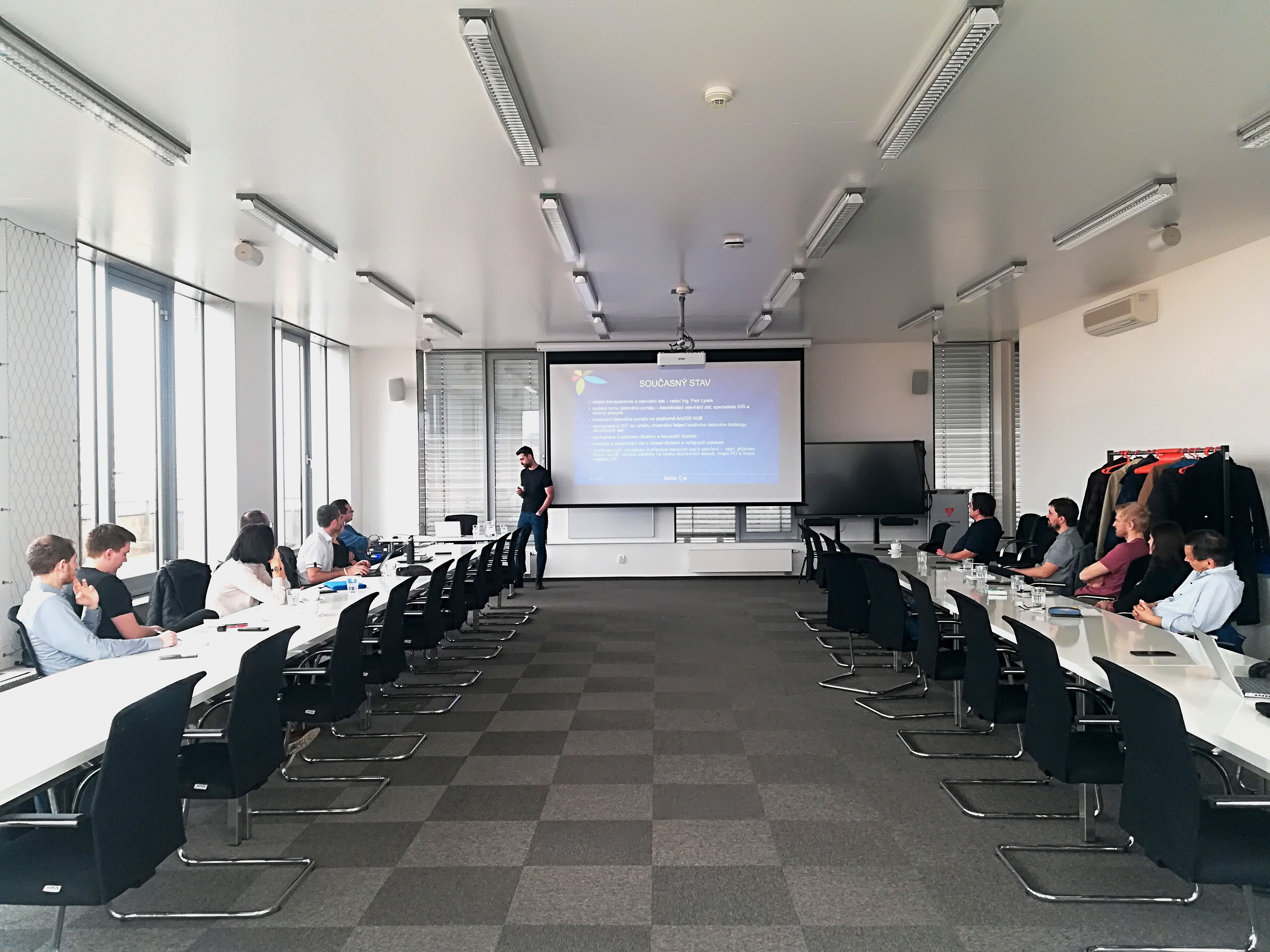
On 28 February, the Pairing Scheme at Palacký University Olomouc was officially launched with a discussion on the process of 'opening' the data and its internal issues, specifics, risks, and expectations both within the university and among the public institutions involved in the project. The overall aim of the discussion was to understand the current practices regarding the acquisition and processing of different types of data, share experiences, and set common mid-term goals. The discussion was opened by presentations from UP, Olomouc Region, and Statutory City of Olomouc, followed by a brainstorming session.
16 February 2024, Treviso, Italy
Bridging Sustainability and Artificial Intelligence
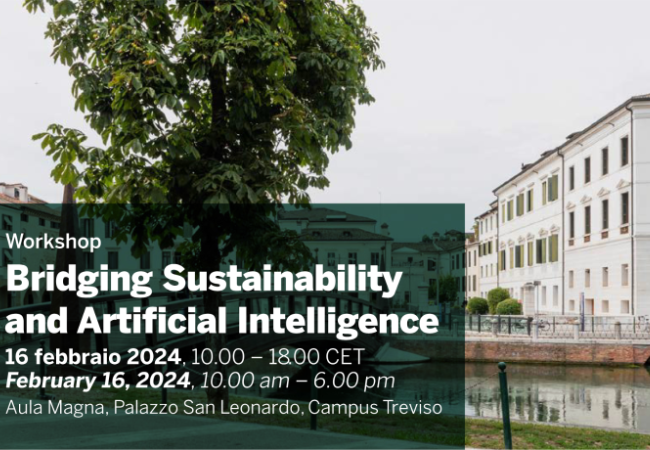
The workshop provided a platform for reflecting on various aspects of
sustainability issues and exploring innovative tools that facilitate the
analysis of their complexity. The objective was to tackle challenges arising from
the economy and society while assessing the potential contributions that new
tools can offer.
The event was divided into two parts. In the morning, there were contributions from the economic and institutional sectors related to the
local area. In the afternoon followed the presentation of
scientific contributions.
Further information can be found in the programme and on the website.
8 February 2024, virtual event, Spain
Presentation of SIMIL Programme and ENGAGEgreen
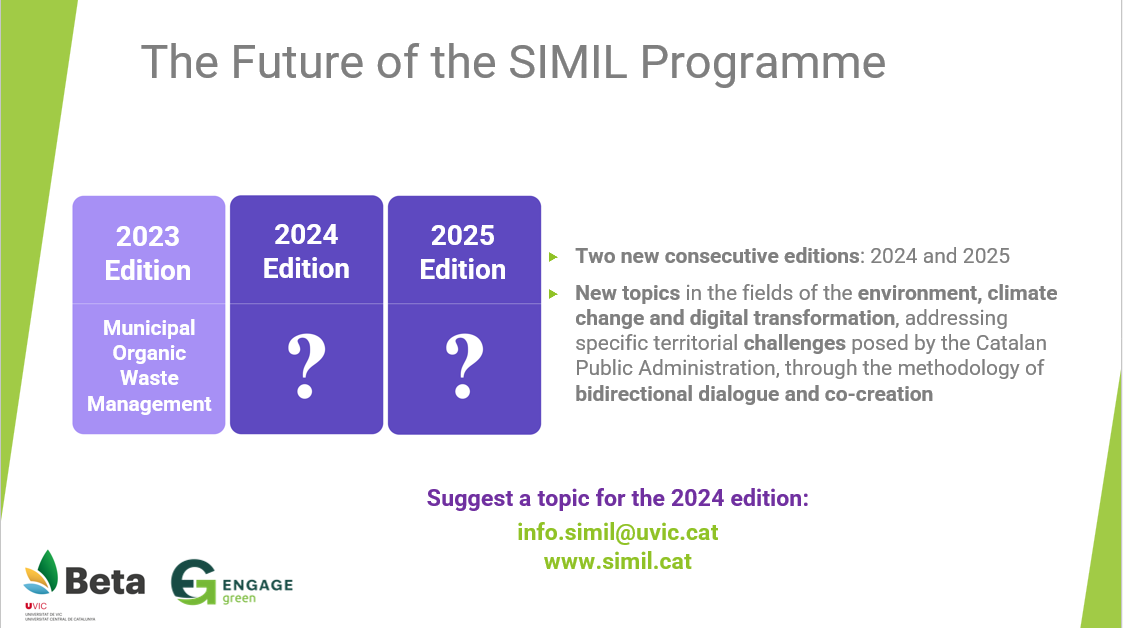
The BETA Technological Center of UVIC-UCC was invited to present our Pairing Scheme - the "SIMIL Programme" - during the online final event of the project ECOPAP. This project, managed by the CREDA research center is focused on promoting solutions that help to face the challenge of managing plastic waste from the agri-food sector. In this online event BETA presented the methodology of the Pairing Scheme and results of the 2023 edition on the topic of municipal organic waste management, but also introduced the upcoming ENGAGEgreen Pairing Schemes on new topics in 2024 and 2025.
24-26 January 2024
Kick-off meeting at the Université Lumière Lyon 2
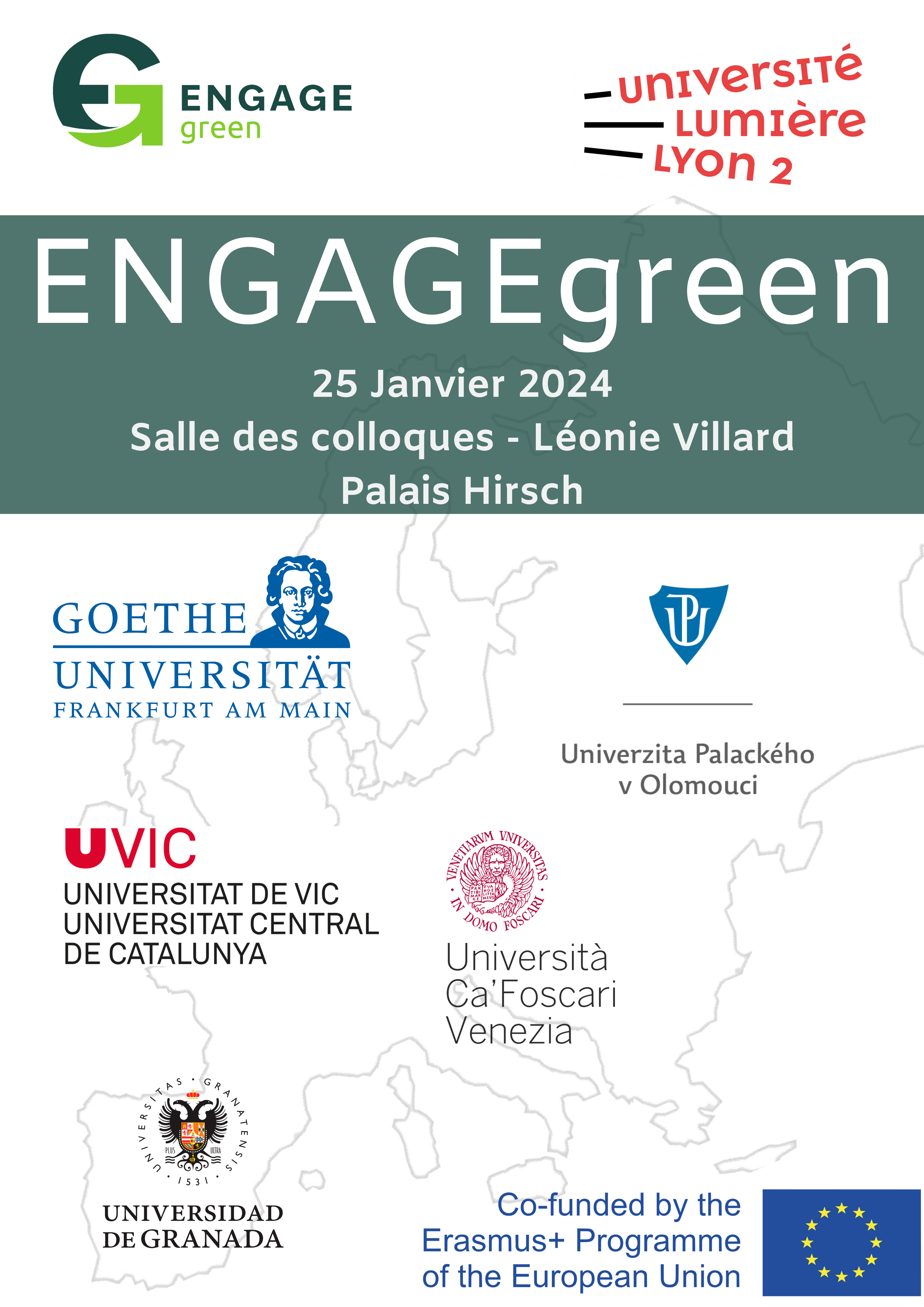
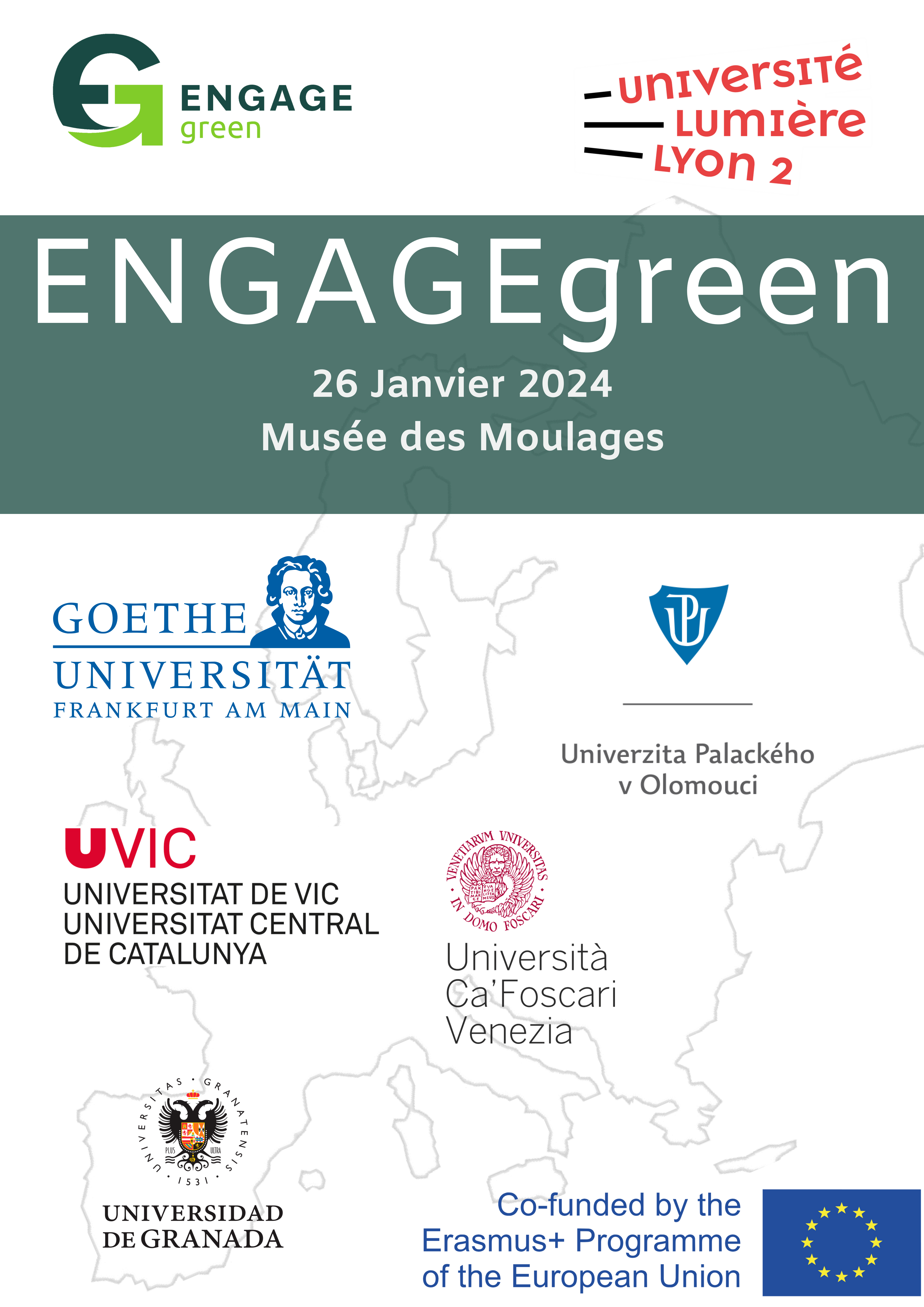
19 Januar 2024
Early Career Researchers meet Policy Professionals

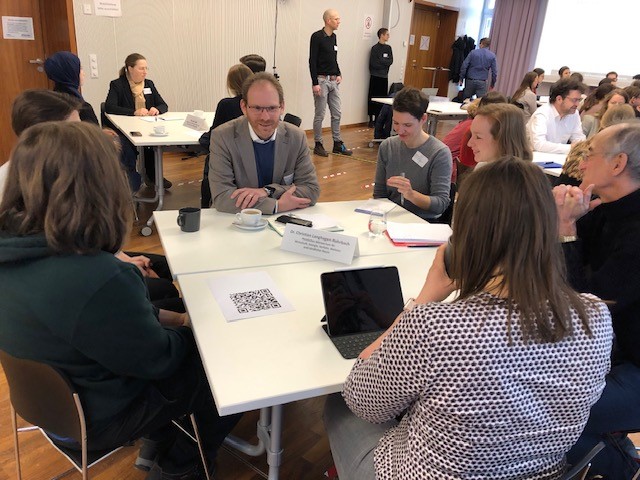
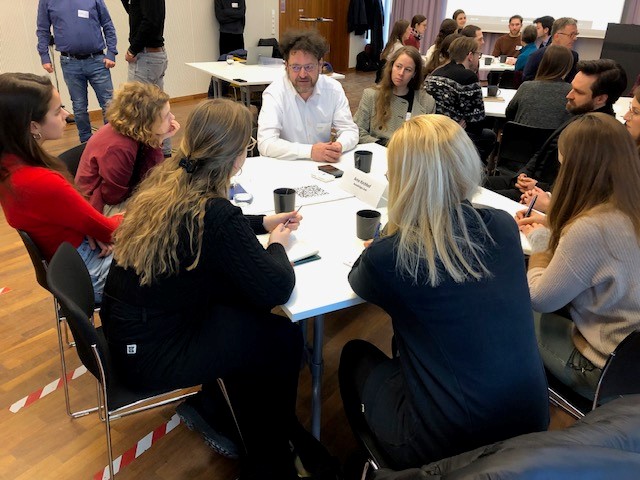
Contact
Research Support
Goethe University Frankfurt am Main
Theodor-W.-Adorno-Platz 1
D-60323 Frankfurt am Main
Phone: +49 69 798 12132 / 12135
Email: science-policy@uni-frankfurt.de



